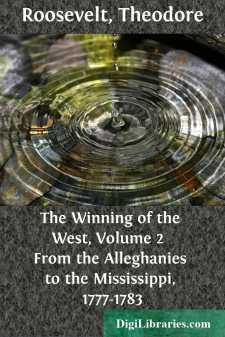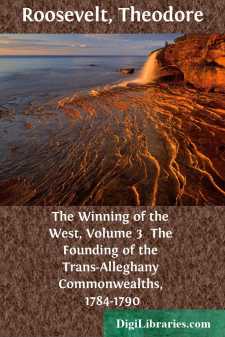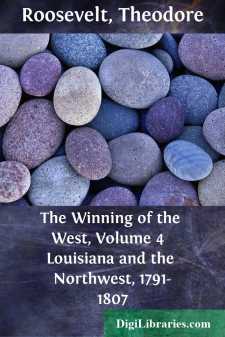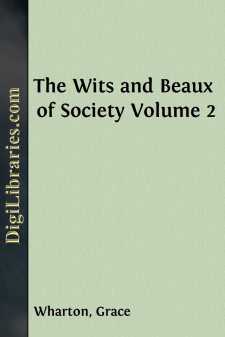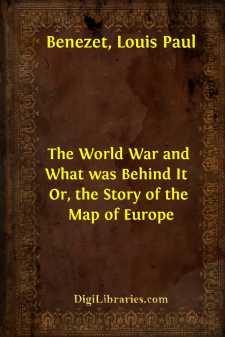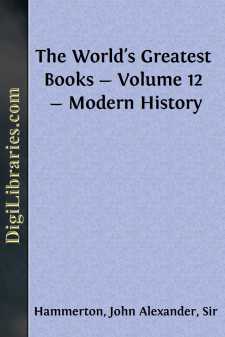History
- Africa 30
- Americas (North Central South West Indies) 50
- Ancient 68
- Asia 58
- Australia & New Zealand 8
- Canada 41
- Caribbean & West Indies 1
- Civilization 20
- Eastern Europe 12
- Europe 310
- Expeditions & Discoveries 60
- General 77
- Historical Geography 1
- Jewish 9
- Latin America 3
- Medieval 8
- Middle East 13
- Military 248
- Revolutionary 8
- Study & Teaching 5
- United States 353
- Western Europe 56
- World 13
History Books
Sort by:
CHAPTER I. THE WAR IN THE NORTHWEST, 1777-1778. The Tribes Hold Councils at Detroit. In the fall of 1776 it became evident that a formidable Indian war was impending. At Detroit great councils were held by all the northwestern tribes, to whom the Six Nations sent the white belt of peace, that they might cease their feuds and join against the Americans. The later councils were summoned by Henry...
more...
CHAPTER I. THE INRUSH OF SETTLERS, 1784-1787. At the beginning of 1784 peace was a definite fact, and the United States had become one among the nations of the earth; a nation young and lusty in her youth, but as yet loosely knit, and formidable in promise rather than in actual capacity for performance. The Western Frontier. On the western frontier lay vast and fertile vacant spaces; for the Americans...
more...
CHAPTER I. ST. CLAIR'S DEFEAT, 1791. The Westward March of the Backwoodsman. The backwoods folk, the stark hunters and tree-fellers, and the war-worn regulars who fought beside them in the forest, pushed ever westward the frontier of the Republic. Year after year each group of rough settlers and rough soldiers wrought its part in the great epic of wilderness conquest. The people that for one or...
more...
by:
Grace Wharton
GEORGE VILLIERS, SECOND DUKE OF BUCKINGHAM. Signs of the Restoration.—Samuel Pepys in his Glory.—A Royal Company.—Pepys 'ready to Weep.'—The Playmate of Charles II.—George Villiers's Inheritance.—Two Gallant Young Noblemen.—The Brave Francis Villiers.—After the Battle of Worcester.—Disguising the King.—Villiers in Hiding.—He appears as a...
more...
by:
Grace Wharton
HORACE WALPOLE.The Commoners of England.—Horace's Regret for the Death of his Mother.— 'Little Horace' in Arlington Street.—Introduced to George I.— Characteristic Anecdote of George I.—Walpole's Education.—Schoolboy Days.—Boyish Friendships.—Companionship of Gray.—A Dreary Doom.— Walpole's Description of Youthful Delights.—Anecdote of Pope and Frederic of...
more...
by:
Robert Herrick
I Italy Hesitates Last April, when I left New York for Europe, Italy was "on the verge" of entering the great war. According to the meager reports that a strict censorship permitted to reach the world, Italy had been hesitating for many months between a continuance of her precarious neutrality and joining with the Allies, with an intermittent war fever in her pulses. It was known that she was...
more...
Chapter I The Great War The call from Europe.—Friend against friend.—Why?—Death and devastation.—No private quarrel.—Ordered by government.—What makes government?—The influence of the past.—Four causes of war. Among the bricklayers at work on a building which was being erected in a great American city during the summer of 1914 were two men who had not yet become citizens of the United...
more...
I.--The Nile and Egypt A long, low, level shore, scarcely rising above the sea, a chain of vaguely defined and ever-shifting lakes and marshes, then the triangular plain beyond, whose apex is thrust thirty leagues into the land--this, the Delta of Egypt, has gradually been acquired from the sea, and is, as it were, the gift of the Nile. Where the Delta ends, Egypt proper begins. It is only a strip of...
more...
SAMUEL ELIOT History of the United States Samuel Eliot, a historian and educator, was born in Boston in 1821, graduated at Harvard in 1839, was engaged in business for two years, and then travelled and studied abroad for four years more. On his return, he took up tutoring and gave gratuitous instruction to classes of young workingmen. He became professor of history and political science in Trinity...
more...
I AFTER THE VICTORY 1 At these moments of tragedy, none should be allowed to speak who cannot shoulder a rifle, for the written word seems so monstrously useless, so overwhelmingly trivial, in front of this mighty drama which shall for a long time, it may be for ever, free mankind from the scourge of war: the one scourge among all that cannot be excused, that cannot be explained, since alone among all...
more...


